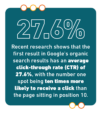SEO, PPC, and Digital Marketing
There are many acronyms associated with digital marketing, and differentiating them can be difficult. While search engine optimization (SEO) and pay-per-click (PPC) are key to building brand awareness, there are fundamental differences.
With effective SEO and PPC strategies, B2B companies can better align their brand-to-demand activities to capture qualified leads through organic and paid search.
SEO’s Impact on Organic Search Results, CTR, and More
 When searching for something online, whether a product, service, or information, the first place many of us go to is Google. When met with results from our query, most are inclined to click on the first few results. Recent research shows that the first result in Google’s organic search results has an average click-through rate (CTR) of 27.6%, with the number one spot being ten times more likely to receive a click than the page sitting in position 10.
When searching for something online, whether a product, service, or information, the first place many of us go to is Google. When met with results from our query, most are inclined to click on the first few results. Recent research shows that the first result in Google’s organic search results has an average click-through rate (CTR) of 27.6%, with the number one spot being ten times more likely to receive a click than the page sitting in position 10.
When consulting with clients, we discuss “page one feasibility,” or the likelihood that a website page will rank on Google page one. With only .63% of searchers clicking on something on Google page two, earning a position on page one is essential.
SEO is based on search terms and keywords, meaning keyword research is crucial so you can incorporate keywords into your strategy that people are searching for. After selecting keywords for your brand and its products and services, incorporating them into website pages and meta tags through search-optimized content can improve your brand’s search results.
SEO best practices can also be incorporated into press releases and organic social media to generate the most engagement around your content.
Boosting Visibility and Revenue with PPC
Unlike SEO, PPC is online advertising that involves placing ads on search engine results pages. It involves bidding on specific keywords so your ads appear on search engine results pages. The most widely used PPC platform is Google Ads, followed by Bing Ads.
For a PPC strategy to be successful, conducting thorough keyword research to identify keywords associated with your brand, products, and services is essential. Doing so will enable you to create multiple campaigns in Google Ads that use these keywords for ad targeting. By bidding on these keywords, your chances of ranking in the search results and attract more clicks to your website. One of the benefits of PPC is that paid results appear above organic results.
The top search result is a Google Ad — the “Ad” signifier next to the text means Semrush is running Google Ads and bidding on this search term. The below result in purple is an organic search result, meaning the page is successfully optimized for SEO and ranks high for the search term “what is SEO.”
Combine the Two!
The brand-to-demand approach to an integrated PPC and SEO strategy ensures that channels complement one another, boosting marketing ROI.
Bridging SEO and PPC for a Cohesive Brand-to-Demand Framework
 Harnessing SEO and PPC can fill the gaps in your brand’s online visibility. Keywords that may not rank organically can be used in paid search campaigns. By blending these efforts, you can strategically allocate your budget, steering clear of bidding on keywords already performing well organically.
Harnessing SEO and PPC can fill the gaps in your brand’s online visibility. Keywords that may not rank organically can be used in paid search campaigns. By blending these efforts, you can strategically allocate your budget, steering clear of bidding on keywords already performing well organically.
Analyzing your paid search campaigns can provide valuable insights into your SEO strategy. With PPC, you can quickly and easily see the results of your campaigns in real-time, allowing you to identify which specific keywords are driving traffic to your website, what messaging is most effective, and which call-to-actions are generating the most engagement. This information is crucial for optimizing your website and incorporating top-performing assets into new or existing content.
For instance, repurposing high-performing ad copy from Google Ads into a content headline or using the Search Term section to glean what prospective customers are searching for can fuel your content creation or optimization strategy. Evaluating the success of campaigns can also pinpoint where to bolster your SEO efforts.
Leveraging SEO and PPC in B2D
Tailoring SEO and PPC to specific search queries or phrases augments your brand’s visibility and conversion potential. While SEO aims for organic ranking and informative content, PPC acts as a catalyst for conversions.
PPC can trigger immediate traffic and brand recognition. Launching campaigns with robust keywords, enticing ad copy, and competitive bids can bring your ad to prime positions in search results. This immediacy is invaluable for time-sensitive promotions or when spotlighting significant brand updates like rebrands or new offerings. Moreover, PPC’s geo-targeting feature on Google Ads can hone in on specific demographics, making it a powerful tool for event-specific or localized marketing.
Conversely, SEO is a long-term strategic investment, driving sustained traffic without the recurring costs associated with PPC. It’s a sturdy foundation for brand building or rebranding, facilitating a deeper understanding of your brand before users actively seek it out. Achieving a rank on Google means a continuous flow of new user traffic to your website, provided the content remains optimized. SEO is necessary if your brand has a limited paid media budget but wants to gain awareness in search.
Amplifying SEO Efforts with PPC
 Combining your ongoing SEO efforts with PPC can boost your SEO. Paid search does a great job creating brand awareness because people who do not know about your brand will start to see it at the top of their search results when searching for similar products or services. This brand exposure further encourages people to search organically for and click on your SERP links — elements that appear in Google search results include featured snippets, instant answers, knowledge panels and images.
Combining your ongoing SEO efforts with PPC can boost your SEO. Paid search does a great job creating brand awareness because people who do not know about your brand will start to see it at the top of their search results when searching for similar products or services. This brand exposure further encourages people to search organically for and click on your SERP links — elements that appear in Google search results include featured snippets, instant answers, knowledge panels and images.
Paid search can help you leverage your most valuable pages by getting your content in front of the right people. While SEO can generate traffic to your valuable pages in the long run, paid search can drive high-quality traffic to these pages in a shorter amount of time. As a result, you can drive more traffic to the page, improving online visibility, engagement, and generating quality leads up front. Using paid search right away will allow you to quickly identify the keywords and content that are driving conversions and leads, giving you a stronger idea of where to focus with SEO.
Merge SEO & PPC for a Balanced Approach to B2D
Integrating PPC with your SEO strategy can be extremely beneficial in growing brand awareness, getting in front of users with high intent, and creating content and website pages that align with organic search. Combining the two is integral in any successful digital marketing strategy and using PPC to guide and optimize SEO will provide a more efficient, data-driven approach to search that will allow for an increase in leads, conversions and overall ROI.
Learn more about the power of brand-to-demand marketing for your business’ long-term success.




